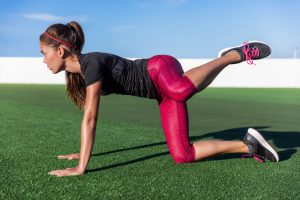If you find yourself repeatedly having difficulty with your sprints, or perhaps having to deal with lower body injuries, there could be a problem with your gluteal strengthening routine. The gluteal muscles, or your buttocks, are often overlooked in everyday activities.
If you think that the gluteal strengthening is not important, think again. The glutes are the largest and strongest muscle of the body.
The gluteal muscles comprise of three muscles which make up one’s buttocks – Gluteus Maximus, Gluteus Medius, and the Gluteus Minimus. The function of the gluteus maximus extends and rotates the thigh laterally while the Medius and Minimus abducts and rotates the thigh medially. The gluteal muscles act as a hip extensor to stabilize your pelvis and spine during activities by counteracting gravity’s force on your body. By doing this, they allow you to maintain proper leg alignment through adduction and abduction.
Weak gluteal muscles are often inhibited, meaning that they are not being activated properly. Long periods of time sitting in chairs such as in the office will create an imbalance in your muscles, causing your gluteal muscles to become long and weak. In doing so, your neural system “forgets” how to activate the gluteal muscles, which activates other stronger muscles to perform the same task. This creates the potential for injuries.
If you don’t strengthen your gluteal muscles, you run a high risk of developing lower back pain, patellofemoral pain (knee pain), as well as having tight iliotibial bands. Your ankles will tend to overpronate, leading to plantar fasciitis (heel pain) and shin splints along with pain in the Achilles.
Your posture can suffer as your gluteus Medius holds your pelvis upright when you stand. When it’s weak, the piriformis compensates by strengthening and growing larger over time, causing pain in the sciatic nerves. This is known as piriformis syndrome.
Should you find yourself leading a sedentary lifestyle, or if your workout often excludes the gluteal muscles, it’s time for you to start incorporating some exercises regularly to reactivate and strengthen those muscles.
Simple exercises like weighted squats, lunges, and glute raises are essential exercises to perform to be effective at gluteal strengthening. If you have a tight psoas or piriformis muscle, performing the supine stretch and kneeling quadricep stretch will ensure that you remain injury free.
[divider height=”1″ width=”250px” bg_color=”#34ceda” margin_top=”20″ margin_bottom=”20″ alignment=”center” display_icon=”off” /]
In need of Physical Rehabilitation? Schedule an Appointment Today!
If you have any questions, or want a consultation with a professional, feel free to call, or schedule an appointment online at any of our Bergen County or Passaic County offices in New Jersey. Choose from Glen Rock, Franklin Lakes, Fair Lawn, Ridgewood/Ho-Ho-Kus, and/or Clifton – we make it possible for you to visit any of our offices at your convenience.
[divider height=”1″ width=”250px” bg_color=”#34ceda” margin_top=”20″ margin_bottom=”20″ alignment=”center” display_icon=”off” /]
[footer title=”Do you, or someone you know suffer from physical pain? We can help with a simple consultation.”]



